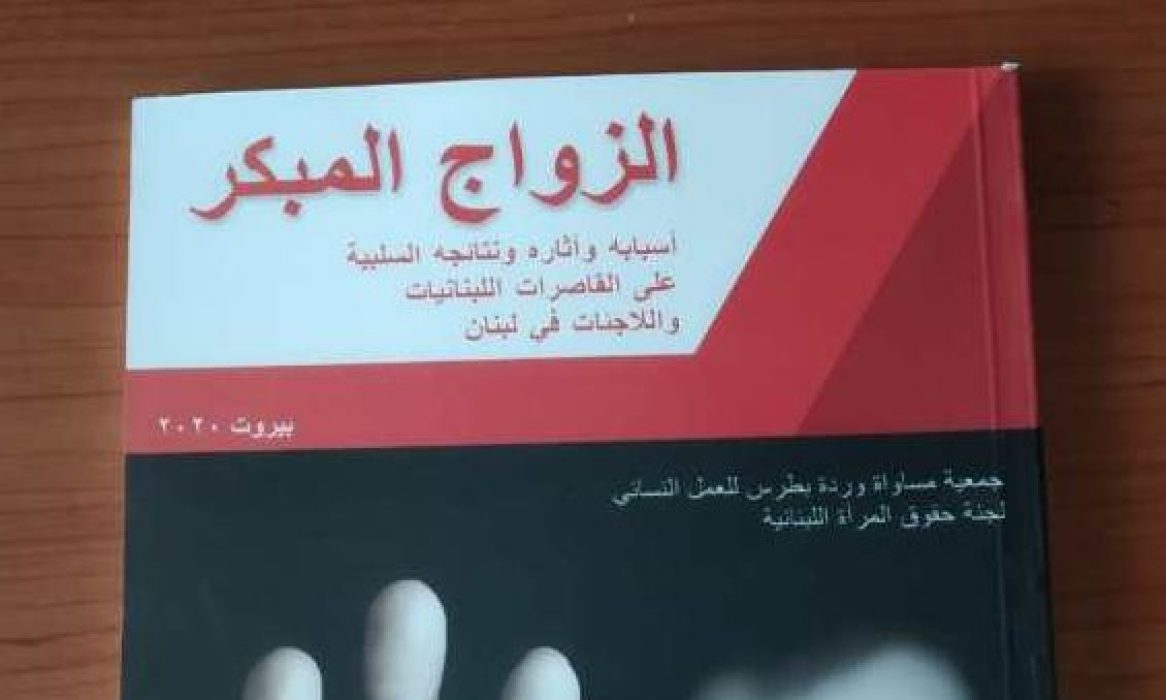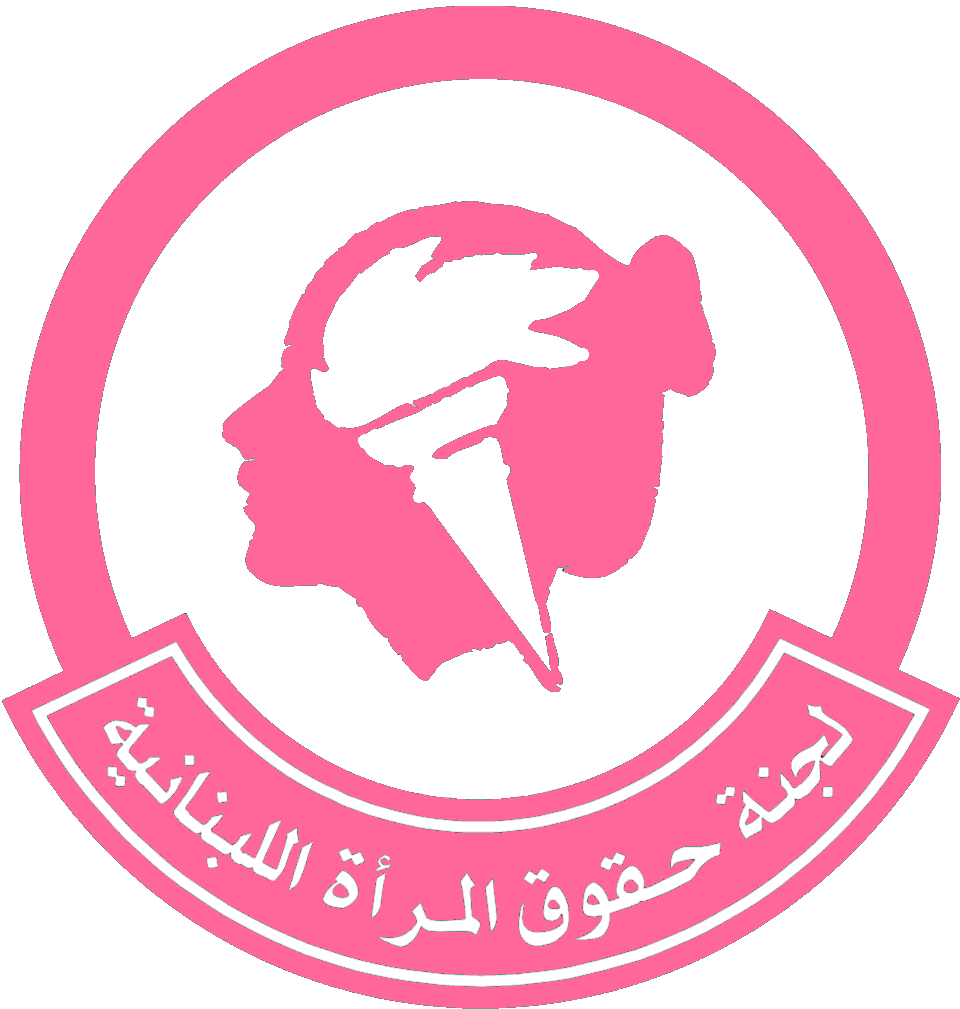خلاصة عن الدراسة الميدانية حول “الزواج المبكر”

خلاصة عن الدراسة الميدانية حول “الزواج المبكر: أسبابه وآثاره ونتائجه السلبية على القاصرات اللبنانيات واللاجئات السوريات والفلسطينيات في لبنان.
الصادرة عن جمعية مساواة – وردة بطرس للعمل النسائي ولجنة حقوق المرأة اللبنانية (تشرين الثاني 2020).
الدراسة من إعداد وإشراف سمير دياب.
تشكل ظاهرة زواج القاصرات انتهاكاً صارخاً لحقوق الطفل، ولحقوق المرأة والإنسان بشكل عام، وتعتبر من أخطر الظواهر الاجتماعية في لبنان والعالم التي تعكس الحيز الثقافي وموروثاته في المجتمع.
فالثقافة، مجموعة معقدة من الخصائص تمثّل عاملاً أساسياً في تشكل التاريخ، وفي صيرورة المستقبل، لِما تتضمنه من مخزون تاريخي يحمل القيم والمفاهيم التربوية والعلاقات الأسرية وتقسيم الأدوار بين الرجل والمرأة.. وغيرها، والذي يتم تناقله وتوارثه عبر الأجيال على أساس أنه الموروث التاريخي. هذا الموروث يتأثر في تاريخيته بعوامل سياسية واقتصادية واجتماعية ودينية وتربوية.. تلعب بدورها الفعل الحاسم في الــتأثير الفكري والاجتماعي على الأفراد والجماعات لفرض ثقافة القوة والهيمنة على موقع القرار من قبل الجماعات والمرجعيات الطبقية والدينية المسيطرة القادرة على إخضاع أغلبية الفئات الاجتماعية لثقافتها وقوانينها، بما في ذلك تعميم ثقافة التمييز على الأساس الطائفي والمذهبي، والتمييز ضد المرأة على أساس النوع الاجتماعي، وتحديد دور المرأة ومستواها في المجتمع، والتحكم بحياتها ومستقبلها عن طريق تشريع جملو مفاهيم بما فيها الزواج المبكر( أو بالاصح التزويج القسري).
وعلى أساس تنامي ظاهرة “التزويج المبكر” في لبنان، وتفاقمها في العقد الأخير، عمدت جمعية مساواة – وردة بطرس للعمل النسائي، وجمعية لجنة حقوق المرأة اللبنانية إلى تنفيذ دراسة بحثية ميدانية ضمن حملة وطنية تهدف إلى القضاء على الزواج القسري المبكر، والمطالبة بتشريع قانون لرفع سن الزواج إلى 18 سنة.
الدراسة من اعداد واشراف د. سمير دياب بمساعدة من الباحث ربيع ديركي والباحث محمد أنور بالتعاون مع مجموعة من الناشطات والناشطين وطلبة الجامعات، جاءت ضمن تنفيذ مشروع “دعم وحماية المرأة اللبنانية واللاجئات من العنف والزواج المبكر” بالشراكة مع الاتحاد الوطني لنقابات العمال والمستخدمين في لبنان، والنجدة الشعبية اللبنانية وبالتعاون مع الجمعية الكتلانية للسلامِACP، والنقابة الكونفدرالية العمّالية الوطنية الكتلانيةFPS، وبدعم من الجمعية الكتلانية للتعاون التنمويACCD. والتي أنجزت في شباط 2020، وصدرت حديثا في تشرين الثاني 2020 تحت عنوان “الزواج المبكر- أسبابه وآثاره ونتائجه السلبية على القاصرات اللبنانيات واللاجئات السوريات والفلسطينيات.
محتويات الدراسة : مقدمة- وفصول ثلاثة
الفصل الاول : الحماية القانونية الدولية والدستورية والتشريعية اللبنانية – التطبيقات والتعديلات، وفيه:
الزواج المبكر وفق الاتفاقات الدولية – انظمة الاحوال الشخصية الطائفية في لبنان- التمييز بحق المرأة – وضع الزواج المبكر في ظل التشريعات المدنية في لبنان (القوانين الجزائية والمدنية)- في تطبيق القوانين والغاء التمييز – القانون المدني الموحد للاحوال الشخصية.
الفصل الثاني: أسباب وآثار الزواج المبكر، وفيه:
الاشكالية البحثية – الاطار والمراجع البحثية – المنهجية- نتائج العمل الميداني وهذا المبحث يتضمن محاور أربعة في “المتغيرات الاجتماعية، وضع الاسرة، آراء المبحوثات والاهل، في عقود الزواج”. الاثار النفسية والصحية والاجتماعية على القاصرات، مستويات وآليات التدخل للمعالجة، تقييم وتحليل.
الفصل الثالث: النتائج والتوصيات
شملت الدراسة 300 حالة من حالات الزواج المبكر من خلال استبيان يشتمل على 60 سؤالا. إضافة إلى لقاءات وجلسات متابعة لاكثر من 76% من المبحوثات. هذا بالاضافة إلى جلسات مشتركة مع بعض أهل المبحوثات حسب توفر أو قبول ذلك.
استمر العمل على الدراسة مدة 6 أشهر( من حزيران لغاية تشرين الثاني 2019)، وشملت كافة المناطق اللبنانية. وقد توزعت النسب المئوية حسب مجتمع دراسة كالتالي: زواج القاصرات اللبنانيات 57,3%، زواج القاصرات من اللاجئات السوريات 30,7 %، زواج القاصرات من اللاجئات الفلسطينيات من سوريا 12%.
في نسب توزع المناطق:
بيروت 35,7%، الجنوب 20,7% ، البقاع 16%، الشمال 15% جبل لبنان 12,6% .
في نسب الطوائف: الطوائف الاسلامية 86% والطوائف المسيحية 14%.
في نسب أعمار القاصرات أثناء عقود الزواج: نسبة 22,7%(بين 12 و14 سنة)، نسبة 23,3%(15 سنة)، نسبة 26,7% (16 سنة)، نسبة 27,3%(17سنة)، صفر% (18سنة وما فوق).
في نسب اعمار المبحوثات اثناء الدراسة:
نسبة 16,8%(من عمر 12- 18 سنة)، نسبة 36,3%( من عمر 19 – 25 سنة)، نسبة 27,6%( من عمر26 الى 30سنة)، نسبة 13,2%(من عمر 31 الى 40 سنة)، 6,1%( من فوق 41 سنة).
في نسبة عقود زواج اللاجئات السوريات المعقودة في لبنان بعد النزوح 39,1%. اما نسبة اللاجئات الفلسطينيات متدنية جدا.
- في مدة الزواج : تبين من عينة المبحوثات أن مدة الزواج تراوحت كالتالي:
5% أقل من سنة زواج. و32% سنتان، 18% ثلاث سنوات، 21% أربع سنوات،11% خمس سنوات، 13% خمس سنوات وما فوق.
- في مستوى التعليم: أمية 14,7% ، ابتدائي 27,3%، اعدادي( متوسط تكميلي) 38%، ثانوي 18%، جامعي وما فوق 2%.
- في الوضع الاجتماعي للقاصرات المتزوجات: 18% فقيرة جدا، 40% فقيرة، متوسطة الحال37,3% ، فوق المتوسط 4,7%.
- في مفهوم وكيفية الزواج المبكر : احتلت التقاليد والعادات الموروثة نسبة 48%، تقدم عريس مناسب 18%، عند بلوغ الفتاة 3%، موروثات دينية 10%، التخفيف من العبء الاقتصادي على العائلة 9%، بلوغ السن الاهلية 11% غير ذلك 1%.
- وصلت النسبة النهائية لعدم معرفة القاصر بمتطلبات الزواج وادواره الى 81%.
- في تقييم رأي المبحوثات القاصرات المتزوجات فإن نسبة 65% منهن غير راضيات عن زواجهن.
- في العلاقات الزوجية بعد الزواج : اشارت النتائج أن نسبة المشاجرات 19%، ونسبة العنف الجسدي 15%، ونسبة الطاعة العمياء 13%، ونسبة العنف اللفظي 10%، في وقت سجلت الدراسة نسبة التفاهم والمحبة 25%، والحوار المتبادل 5%، والعلاقة العادية (لامبالاة) 10%. كما ابرزت الدراسة اسباب المشاكل الزوجية من خلال رأي المبحوثات : 34,6% أزمة اقتصادية ومالية، 18% سلوكيات الزوج، 15,2% مشكلة تربية الابناء، 11,5% مشكلة النزوج والتهجير، 7,2% تنازع الادوار والمهام المنزلية، 6% تدخل أهل الزوج أو أهل الزوجة، 4,3% مشكلة السكن مع عائلة أهل الزوج. 3,2% خلافات حول اكمال الدراسة.
- في الاثار النفسية والاجتماعية للزواج المبكر على المبحوثات ( أكثر من خيار) تبين أن 71% يبكين دون سبب خلال فترة زواجهن، 68% يشعرن بالاحباط واليأس، 49% افدن عن عدم القدرة على التركيز، 53% يشعرن بعدم قبول العلاقة الزوجية، 25% متفاهمات وراضيات مع ازواجهن. 71% لم يتلقين الدعم النفسي.
- في الآثار الصحية : تبين أن 10,8% خضعن لاجهاض متكرر، 29% يعانين من التهابات، 21% تأخر في الحمل، 11% نقص في الوزن، 28% امراض في الجهاز التناسلي أو جهاز التنفس والسكري والضغط.
- في الحالة الاجتماعية للمبحوثات وقت الدراسة: 67,3% متزوجات، 27,3% مطلقات، 4,7% أرامل، 0,7% غير ذلك.
- تبين من خلال الدراسة والعمل واللقاءات مع المبحوثات أن نسبة 88,7% ضد الزواج المبكر ومع تعديل القانون ورفع سن الزواج الى 18 سنة.
- لم يتبين أن معدل نسبة زواج القاصرات في لبنان يظهر تحسنا ملموسا لجهة إنخفاض النسبة ما دون 12% 0 (وفقا لمصادر البحث ووفقا للدراسات المنشورة). بل، أن المعدل يرتفع حسب المناطق خاصة في المناطق والأرياف الفقيرة والمهمشة.
هذه الدراسة البحثية تشكل في نتائجها مادة علمية تضاف إلى الجهود الموضوعة في هذا المجال. لدق “ناقوس الخطر” حول هذه المعضلة الاجتماعية والإنسانية، والعمل على معالجة هذه الظاهرة ومنعها والقضاء على الزواج المبكر أو”التزويج المبكر” وكل أشكال التمييز والعنف ضد المرأة. والتقدم نحو بناء ثقافة المساواة والعدالة الاجتماعية والشراكة بين الجنسين وتطوير القدرات لبناء الوطن الديمقراطي العلماني.
إن لجنة حقوق المرأة اللبنانية وجمعية مساواة – وردة بطرس للعمل النسائي تتقدمان بالشكر والتقدير والمحبة لكل المساهمات والمساهمين في الحملة الوطنية للمشروع وفي تنفيذ الدراسة الميدانية.. وتعاهدان على الاستمرار في النضال إلى جانب حقوق المرأة والمجتمع من أجل تحقيق أهداف الشعب اللبناني في الحرية والديمقراطية والغاء كل أشكال وانواع العنف والتمييز ضد المرأة وتوفير العدالة الاجتماعية والمساواة والشراكة الكاملة في بناء وتنمية المجتمع ضمن الدولة الوطنية الديمقراطية العلمانية.
ملاحظة: الدراسة صدرت في كتاب 120 صفحة (24×17) مع غلاف من تصميم الاستاذ رامي عليان. كان من المقرر أن تُعرض نتائج خلاصة نتائج الدراسة من خلال مؤتمر صحافي لكن التطورات الصحية وانتشار فيروس كورونا وإجراءات الاغلاق والحجر حالت دون ذلك.
بيروت في 1/2/2021
الزواج المبكر @
English Version
Summary of Field Study on Early Marriage
Causes, Effects and Negative Consequences on Lebanese Minors, Syrian and Palestinian Refugees
by The Association of Equality – Wardah Boutros for Women’s Work and
The League for Lebanese Women’s Rights and
(November 2020)
Supervision and preparation: Samir Diab
Underage marriage is a flagrant violation of children’s rights, women’s rights, and human rights in general. It is one of the most dangerous social phenomena in Lebanon and the world reflecting cultural influences and legacies.
Culture is instrumental in the making of history, as well as the future, because of what it carries in terms of values, concepts, and perceptions of family relations and gender roles. This baggage is transmitted across generations as historical heritage, which is influenced by political, economic, social, religious, and educational factors. These components play a decisive role in establishing a culture of power and dominance by the ruling class and religious elites to subjugate the majority and impose their beliefs on others. They seek to propagate, among others, a culture of discrimination based on religion, sect, and gender, define the role and place of women in society and take control over their life and future by normalizing such concepts as early marriage, or more correctly forced marriage.
In light of the worsening phenomenon of early marriage in Lebanon over the last decade, the Association of Equality –Wardah Boutros for Women’s Work (MWB) and the League for Lebanese Women’s Rights (LLWR) carried out a field study as part of a nationwide campaign aimed at eliminating forced early marriage and demanding law amendments to increase the minimum age of marriage for girls to 18 years.
The study is prepared by a team of researchers led by Dr. Samir Diab in cooperation with researchers Rabii Deyraki and Muhammad Anwar, and a group of activists and university students within the framework of the project “Support for and Protection of Lebanese Women and Female Refugees from Violence and Early Marriage” in partnership with the National Federation of Employees’ and Workers’ Unions in Lebanon (FENASOL), Lebanese Popular Relief (SPL), in cooperation with the Catalan Association for Peace (ACP) and the Private Foundation for Peace and Solidarity (FPS), with the support of the Catalan Agency for Development Cooperation (ACCD). The study was completed in February 2020 and published in November 2020 under the title “Early Marriage – Causes, Effects and Consequences on Lebanese Minors and Syrian and Palestinian Refugees.”
Study contents and structure: Introduction and three chapters
Chapter One: Legal protection internationally and in the Lebanese constitution and laws – applications and amendments:
Early marriage according to international conventions; sectarian personal status laws in Lebanon; discrimination against women; early marriage within legislative framework in Lebanon (penal and civil laws); application of laws and elimination of discrimination; unified civil code regulating personal status matters in Lebanon
Chapter Two: Causes and consequences of early marriage:
Research problem; research framework and references; methodology; results of field work with four subsections namely 1) social variables, 2) family situation, 3) opinions of respondents and parents, and 4) marriage contracts; psychological, health and social effects on minors; levels and mechanisms of intervention for solutions; evaluation and analysis
Chapter Three: Findings and recommendations
The study included 300 early marriage cases and was based on a 60-question survey form and interviews (one-on-one meetings and follow-up sessions) with more than 76% of the respondents. Joint sessions with some of the respondents’ parents were also carried out according to availability or willingness to participate.
Data collection lasted for six months from June to November 2019 and covered all Lebanese regions. The study population was made up of three groups: 57.3% Lebanese women, 30.7% Syrian refugee women and 12% Palestinian refugee women from Syria.
- Regional distribution of respondents:
- Beirut: 35.7%
- South Lebanon: 20.7%
- Bekaa: 16%
- North Lebanon: 15%
- Mount Lebanon: 12.6%
- Religion of respondents:
- Islam: 86%
- Christianity: 14%
- Age of respondents at time of marriage:
- 12 to 14 years: 22.7%
- 15 years: 23.3%
- 16 years: 26.7%
- 17 years: 27.3%
- 18 years and above: 0%
- Age of respondents at time of study:
- 12 to 18 years: 16.8%
- 19 to 25 years: 36.3%
- 26 to 30 years: 27.6%
- 31 to 40 years: 13.2%
- 41 years and above: 6.1%
Of all Syrian refugee women interviewed, 39.1% got married after moving to Lebanon. Meanwhile, the percentage of Palestinian refugee women who got married in Lebanon was very low.
- Duration of marriage:
- Less than one year: 5%
- Two years: 32%
- Three years: 18%
- Four years: 21%
- Five years: 11%
- Above five years: 13%
- Educational attainment of respondents:
- No education: 14.7%
- Elementary school education: 27.3%
- Middle school education: 38%
- Secondary school education: 18%
- College education and above: 2%
- Socio-economic situation of respondents:
- Extremely poor: 18%
- Poor: 40%
- Average: 37.3%
- Above average: 4.7%
- Reasons for early marriage:
- Inherited tradition: 48%
- Proposal by suitable groom: 18%
- Reaching puberty: 3%
- Religious customs: 10%
- Reducing economic burden on family: 9%
- Reaching age of marriage (according to religion): 11%
- Other: 1%, 81% of respondents lacked knowledge of the requirements and functions of marriage at the time of their marriage. 65% of respondents showed dissatisfaction with their marriage.
- Marital quality of respondents:
- Quarrels: 19%
- Physical violence: 15%
- Blind obedience: 13%
- Verbal violence: 10%
- Understanding and love: 25%
- Dialogue: 5%
- Indifference: 10%
- Reasons for marital problems:
- Economic and financial issues: 34.6%
- Husband’s behavior: 18%
- Parenting issues: 15.2%
- Migration and displacement: 11.5%
- Conflict of marital roles and household tasks: 7.2%
- Interference from family (husband’s or wife’s family): 6%
- Living with husband’s family: 4.3%
- Disagreements about pursuing education: 3.2%
- Psychological effects of early marriage (respondents selected more than one option):
- Crying for no reason: 71%
- Feelings of frustration and despair: 68%
- Inability to concentrate: 49%
- Inability to accept intimacy: 53%
- Feelings of understanding and satisfaction with the husband: 25%
- Lack of psychological support: 71%
- Health effects of early marriage:
- Repeated miscarriage: 10.8%
- Infections: 29%
- Delayed pregnancy: 21%
- Weight loss: 11%
- Reproductive system diseases, respiratory illnesses, diabetes or hypertension: 28%
- Marital status of respondents at time of study:
- Married: 67.3%
- Divorced: 27.3%
- Widowed: 4.7%
- Other: 0.7%
The study found that 88.7% of respondents are against early marriage and support the amendment of the law to increases the legal marriage age to 18 years.
The study found that the rate of early marriage in Lebanon is around 12%, with the figure increasing in poor and marginalized regions and rural areas.
The findings of the research are important scientific material that add to previous efforts made in this field to sound the alarm about this social and humanitarian dilemma; address, prevent and eliminate early marriage, or forced early marriage, as well as all forms of discrimination and violence against women; and move forward with a culture of equality, social justice, gender partnership and capacity building to establish a secular democratic nation.
The League for Lebanese Women’s Rights and the Association of Equality – Wardah Boutros for Women’s Work extend their thanks, appreciation and love for everyone who contributed to the nationwide campaign of the project and the execution of the field study. We pledge to continue the fight for women’s rights and society to achieve the goals of Lebanese people for freedom, democracy, social justice, equality and the elimination of all forms of violence and discrimination against women to build and develop a society within a secular, democratic, national state.
Note: The study was published in a book of 120 pages (24 x 17) with a cover designed by Ramy Alayan.
The results of the summary study were to be presented through a press conference but the health developments , spread of the Corona virus and the lockdown and quarantine measures prevented this.
Beirut 1/2/2021
الزواج المبكر@



